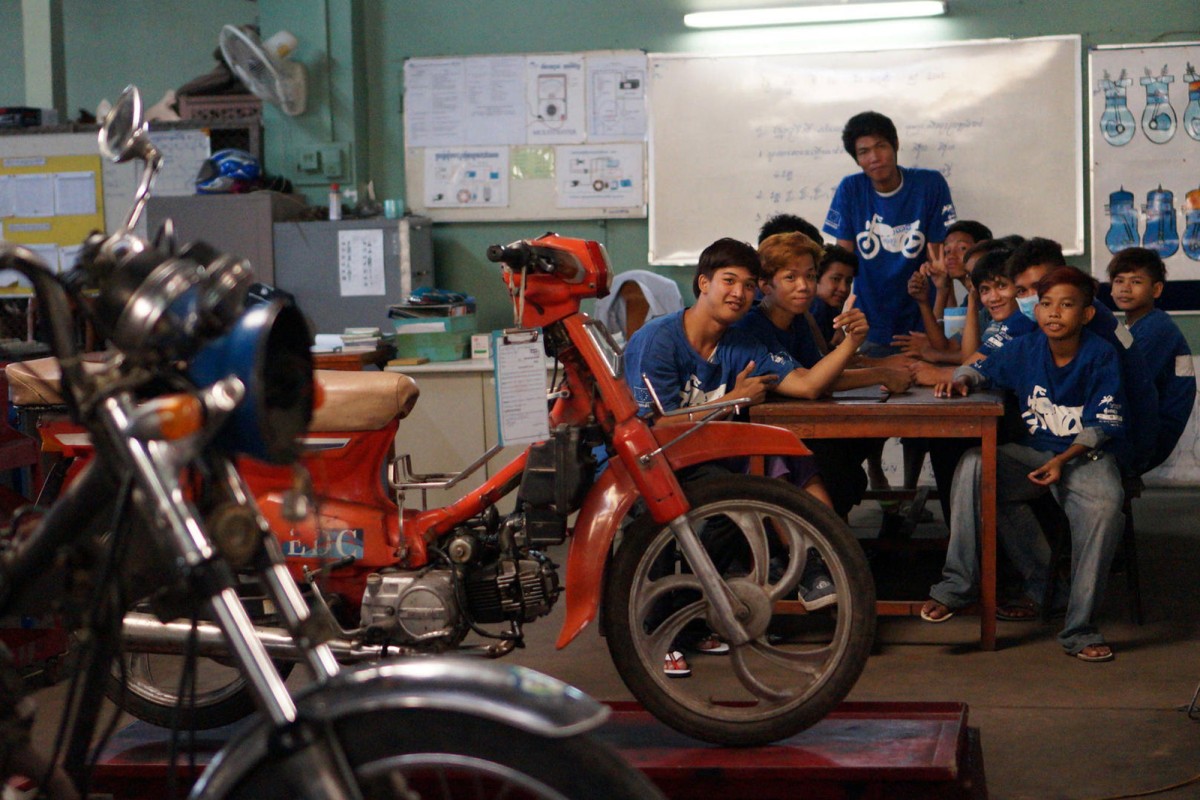 Students learn how to repair motorbikes with the Mith Samlanh programme.
Students learn how to repair motorbikes with the Mith Samlanh programme.Friends the Restaurant is ranked as the tenth best restaurant in Phnom Penh on TripAdvisor. It’s also a training restaurant where former street children practise cooking and serving skills.
Vibol* was 16 when he moved with his older brother to Phnom Penh in 2000, 285 kilometres away from his home in Kratie Province. His father had divorced his mother, forcing her to sell their land to keep Vibol and his four siblings. Thinking there were better opportunities in the capital city, he left home. His brother soon found work in a factory, leaving Vibol to live alone to look after himself as a casual construction worker.
To pass the time, Vibol would take walks along the riverside. One day, he met a group of guys who offered him a job as a sugar cane seller. All he had to do, they said, was to bring a matchbox to where they told him to.
“I earned US$15 each time I did it. I wondered why such a small box was worth so much money. I didn’t know there was cocaine inside,” Vibol tells Young Post. For six months, he trafficked drugs three times a day. But he never got rich. “It was difficult to keep the money. I was always robbed. The boss told people to rob me after I was paid,” he said.
Outreach workers from Mith Samlanh, a programme under Unicef partner Friends International, had invited him to do some vocational training at their centre, but Vibol didn’t listen. It was only after the police detained him for a whole night that Vibol decided to study at Mith Samlanh.
James Farley, a social worker from the UK who has been with Mith Samlanh for five years, says one of the biggest challenges they face is keeping street children in school. “There’s friendship on the streets, and there’s no school, so there’s lots of freedom. It’s just easier and very appealing to them,” he says.
Mith Samlanh organises games and performances to attract street children, and offers a wide range of vocational courses. People can learn how to cook, repair motorbikes, become nail technicians or become electricians. It also teaches parents to make products and jewellery from recycled materials, such as colourful earrings made from rolled newspaper and waterproof notebooks made from old tyres. Home-based jobs allows people with disabilities and stay-at-home parents to earn a stable income, encouraging them to let their children to go to school instead of working.
“There are more than 600 orphanages in Cambodia, but many of the children aren’t orphans. Their family sends them there because they’re too poor to take care of them,” says Farley. “Many orphanages treat the children poorly so tourists will donate to them. It’s a business.”
While Mith Samlanh approached more than 9,000 street children and sent 500 of them back to public school, Farley says a lack of qualified social workers also makes it hard for them to identify potential dangers that street children are facing.
As the New York Times reports, Cambodia’s first university programme to train social workers began in 2008 at the Royal University of Phnom Penh. The first batch of 22 students only graduated three years ago. The government’s National Institute of Social Affairs introduced another programme, and its first class is expected to graduate next year.
To foster a safe environment for street children, Mith Samlanh has been recruiting help from the community. They run the ChildSafe Network Programme in Phnom Penh, with more than 3,000 active members including drivers, guesthouse personnel and street vendors, who wear a special T-shirt and are trained to identify a child in danger.
Sunny Ho Chun-tat, one of the Hong Kong Unicef Young Envoys who visited Mith Samlanh, compared Cambodia’s situation to Hong Kong’s. “Hong Kong’s street children are somewhat abandoned by society. It’s not that they don’t get the chance to study, but they’ve been kicked out of school because of their poor grades, or the pressure’s so huge that they have no motivation to study,” says the Form Four CCC Ming Yin College student.
Elaine Cheng Hau-yau, a Form Six student at Holy Trinity College, agrees. “Cambodian children need basic things like food and shelter.
Hong Kong street
Mith Samlanh’s programmes also made Silvy Chan Sze-wai realise the amount of work that had to be put in to help street children. “I’ve been in Cambodia before on a school service trip, but that time I only played and laughed with the kids. This time I could step back and see all the hard work behind these children’s smiles,” says the Form Six Marymount Secondary School student. “I wonder if I can be the next person to give so much.”
But Cambodians are hoping to rely less on outside help. Vibol, now 31, is a full-time cooking teacher at Friends the Restaurant. He is the proud father of a one-year-old daughter and earns US$350 a month, almost four times the average wage of a teacher. “I’m glad I can help others in the same way people helped me,” he says.
*Vibol’s name has been changed to protect his identity
Want to take part?
Unicef HK is now accepting applications for Young Envoys 2016. Those aged between 12 and 18, and full-time students, are eligible.
Application deadline: November 2
For more information, visit: Unicef's website.
